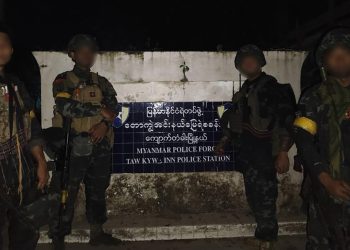Many books have been written on the contemporary history of Myanmar. It is impossible to exclude Myanmar’s military and its generals if you are to write a book on Myanmar’s history since her independence. Some ex-military officers have told their side of the story in books. But are they credible?
To put it simply, history is much distorted in their books, which give the military praise and Daw Aung San Suu Kyi and her National League for Democracy criticism, while blowing their own trumpets and boasting of the achievements of their colleagues. Such books have continued to come out after the military coup.
Despite their different ranks, the authors of those books—Soe Thane, Khin Nyunt, Ye Htut, Tun Kyi and so on—have one thing in common. They all defend the regimes, previous and current, in their books. Here are some of the books—which you should neither place on your book shelves nor invest your time and money in.
Second Democratic Government and Myanmar
by former Vice Admiral Soe Thane
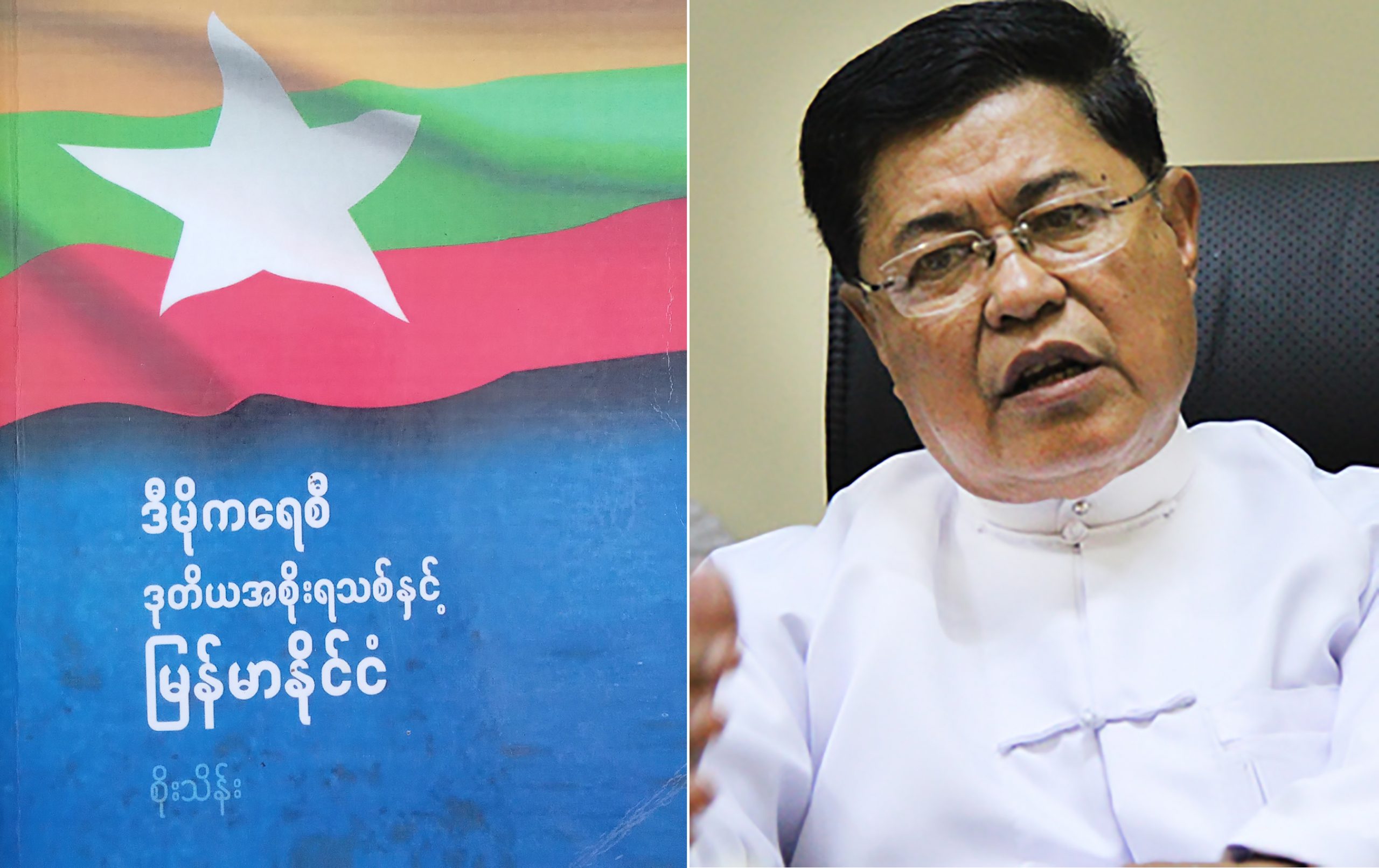
This book is not publicly available, and only distributed among military personnel and members of the military’s proxy Union Solidarity and Development Party.
The first volume of “Second Democratic Government and Myanmar”, referring to the term of the NLD government under Daw Aung San Suu Kyi from 2016 to 2020, was published in October 2020, and the second volume was published in August 2021, seven months after the coup.
State Administration Council members Thein Nyunt and Padoh Mahn Nyein Maung wrote forewords for the book. The SAC is the current junta’s governing body.
Soe Thane, a former Navy chief and vice admiral who was widely regarded as a reformist minister in U Thein Sein’s quasi-civilian government, revealed his true colors when he wrote “Our Myanmar’s independence was restored on Feb. 1, 2021.” His book disparages the NLD government from whom the military seized power and is not short of personal attacks against Daw Aung San Suu Kyi.
Surprisingly, the books feature many examples of hate speech and incendiary posts shared by anti-NLD individuals, nationalists and military supporters on their Facebook pages, reflecting Soe Thane’s grudge against and jealousy of Daw Aung San Suu Kyi. Even U Ye Htut, the former information minister in U Thein Sein’s government, agrees with that fact.
Overall, the books argue that the NLD can’t continue to hold office, and the military must take power. He is reportedly lobbying for Min Aung Hlaing’s regime from behind by reaching out to international diplomats he knows while discrediting pro-democracy forces.
It was widely believed that the 73-year-old had influence on former President Thein Sein. One of the few other books he has authored is “New Democratic Government and President U Thein Sein”, in which he showers praise on the ex-general.
Myanmar’s Political Transition and Lost Opportunities
by former Lieutenant Colonel Ye Htut
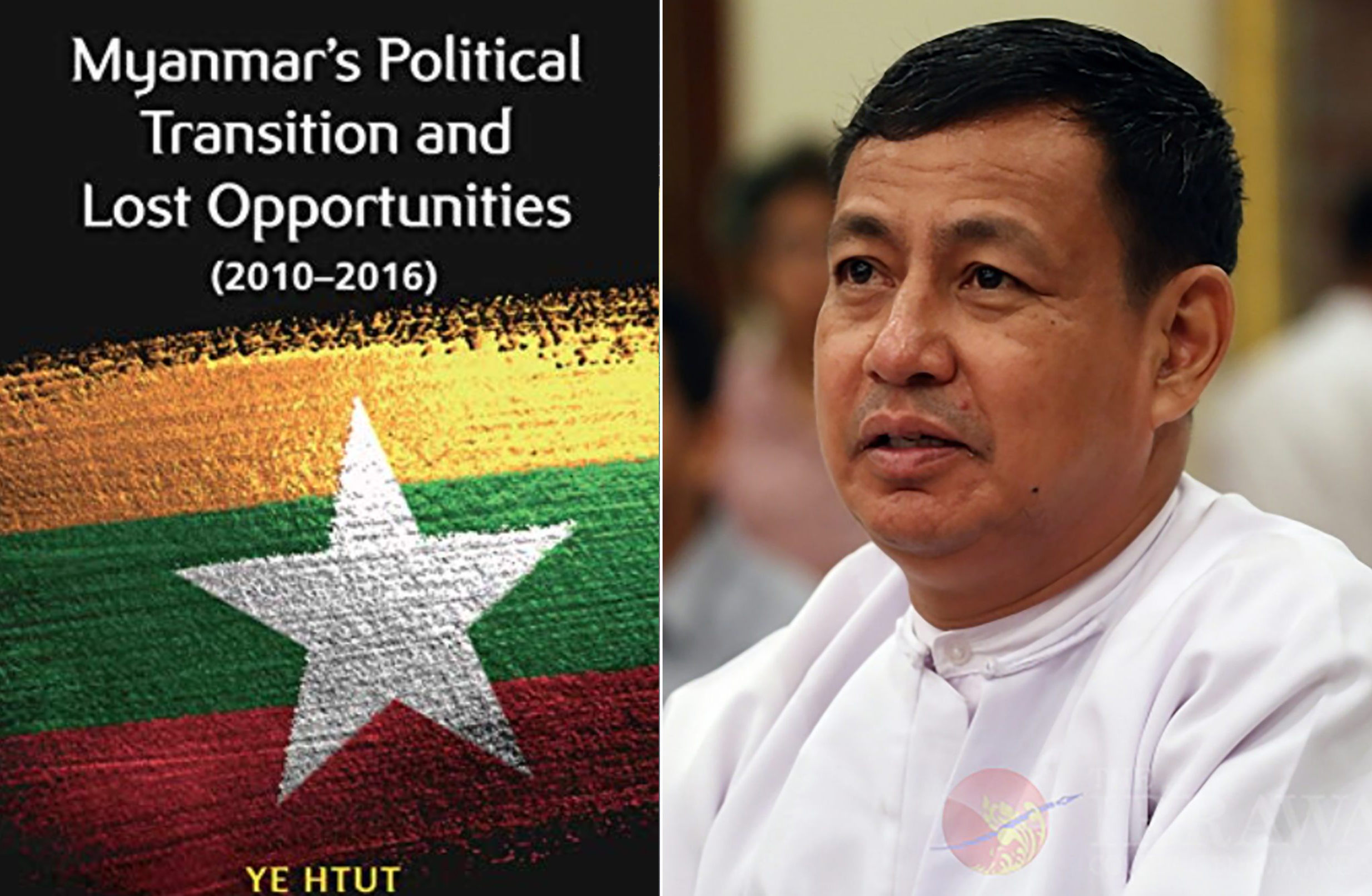
Ye Htut expressed his gratitude to U Thein Sein, who appointed him as his spokesman and information minister, by writing “Myanmar’s Political Transition and Lost Opportunities (2010-2016)”.
The English-language book was published by Singapore ISEAS-Yusof Ishak Institute and comes with a foreword by Robert H. Taylor, who was known as a defender of military regimes. Retired Navy chief Thura Thet Swe, who was a classmate of Ye Htut at the Defense Services Academy, translated the book into Burmese.
The book features less-known facts about the Thein Sein administration, and the power struggle between Thein Sein and Lower House Speaker Shwe Mann, both of whom joint-chaired the USDP. The book draws on Ye Htut’s experiences as a Thein Sein cabinet member and on extensive interviews with other cabinet members.
In a word, the book is an encomium for ex-general Thein Sein, who was hailed by Ye Htut as a one-in-a-million reformist president who transformed Myanmar while enduring the attacks of Shwe Mann and some USDP leaders.
Reading the books of Soe Thane and Ye Htut together, readers may be deceived into feeling that Thein Sein’s political ups and downs are more touching than the story of Daw Aung San Suu Kyi who was and is still unfairly detained, having been persecuted by successive military regimes.
While Ye Htut portrays Shwe Mann as the villain always attacking Thein Sein, Shwe Mann, in his book “She, I and Myanmar’s Politics”, which is about the relationship between him and Daw Aung San Suu Kyi, wrote that he had to put a handgun below his pillow at night amid the feuds.
It is fair to say that through his book Ye Htut urges the USDP to take lessons from the party’s defeat in the 2015 general election, which he thinks was caused by the rift between the generals and the party leadership. The book was published a few months before the 2020 general election.
As Ye Htut was a military officer himself and his book draws heavily on interviews with former ministers and former generals including the former military intelligence chief Khin Nyunt, it is not surprising that the book doesn’t highlight the crimes committed by the military against civilians.
Today, Thein Sein leads a life of ease at his palatial mansion in Naypyitaw, planting trees and drawing pictures. The ex-general was last seen in public when he consecrated a pagoda in May in Naypyitaw.
Ye Htut was part of the 22nd intake of the Defense Services Academy together with deputy junta chief Soe Win, SAC member General Yar Pyae and regime Information Minister Maung Maung Ohn. He is therefore widely regarded as close to the current regime.
Though some observers call him a moderate, Ye Htut is nothing more than an ex-military officer who is heavily attached to the military, which has only destroyed the country in successive periods.
When asked by The Irrawaddy following the NLD’s electoral victory in the 2015 general election if he would accept a position in the NLD government’s cabinet, Ye Htut replied he would not play for another team, showing that he will remain loyal even if he is playing for the wrong team—just as he defended his former institution, the army, in his book.
Willing to Risk My Life and Soul
by former Defense Minister Lieutenant-General Wai Lwin
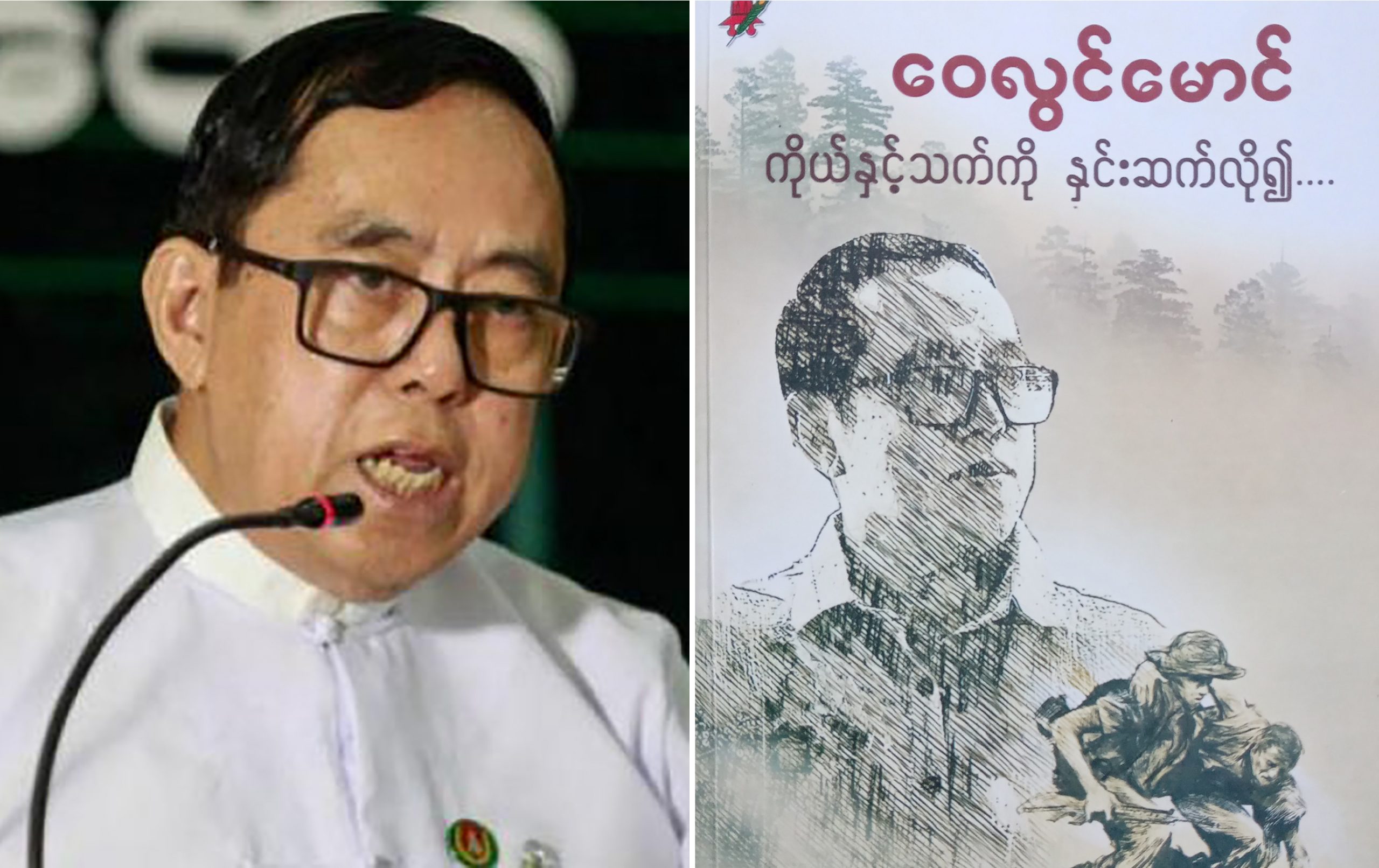
This book is an autobiography by former Lieutenant General Wai Lwin who is currently a senior figure in the USDP and served as the defense minister in the Thein Sein administration. It was published by the military-owned Myawady Publishing House after the 2021 military coup. He wrote the book under the pseudonym Wai Lwin Maung.
Ex-Lieutenant Colonel and current regime minister Chit Naing and ex-Lieutenant Colonel Ohn Maung, who concurrently chairs the Myanmar Press Council and Myanmar Writers Association, wrote forewords for Wai Lwin.
The chairman of the Naypyitaw USDP, who organized pro-military rallies before and after the coup in the administrative capital, expresses his support for the coup in his book. He calls the NLD a state-destroying government under the thumb of the Central Intelligence Agency and the Organization of Islamic Cooperation (OIC). He echoes Min Aung Hlaing’s claim of vote-rigging by the NLD in 2020 general election. His disapproval of the NLD’s appointment of foreign advisers and his accusations against the NLD about the OIC and Rohingya are similar in tone to Soe Thane in his book “Second Democratic Government and Myanmar”.
While the junta troops were gunning down civilians in street protests, Wai Lwin writes that he sympathizes with and praises the Tatmadaw (Myanmar’s military) members who have to engage in more tiring work than before. Wai Lwin expresses his gratitude to former military dictator Than Shwe and his deputy Maung Aye, while slamming the NLD and praising the current regime.
Wai Lwin served as the deputy of Lieutenant General Myint Swe (the acting president of the current regime) when he was the commander of Yangon Region Command. He was also a follower of Than Shwe, who appointed him the chief of Naypyitaw Command. He became the defense minister under the Thein Sein administration.
Wai Lwin is the classmate of USDP chairman former Brigadier-General Than Htay and regime International Cooperation Minister U Ko Ko Hlaing, who a graduate of the 18th intake of the Defense Services Academy.
My Life Experience
by former Military Intelligence Chief General Khin Nyunt
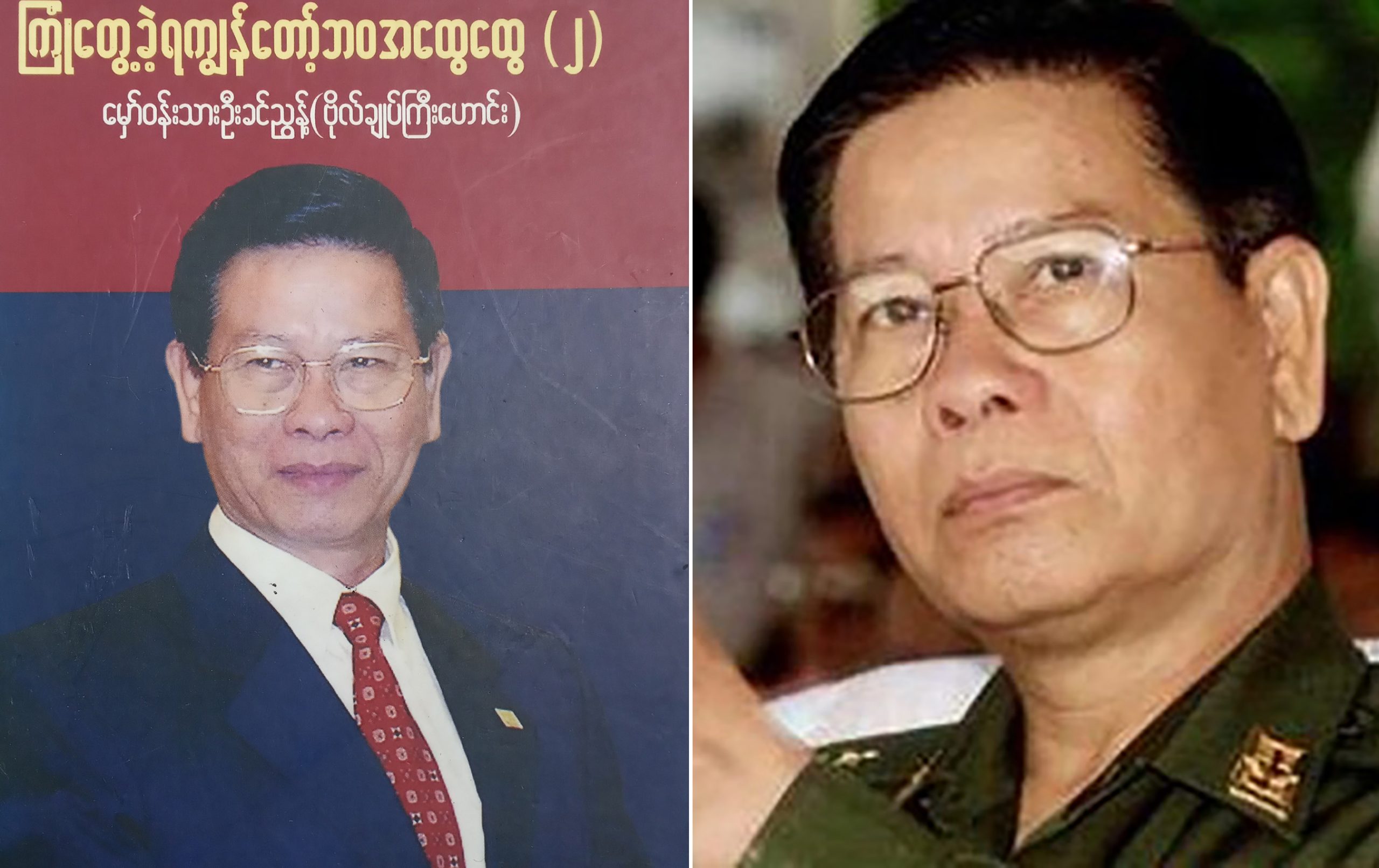
This is the two-volume autobiography of former military spy chief Khin Nyunt. “My Life Experience” covers the former general’s rise through the country’s armed forces to the head of Military Intelligence (MI), his role in negotiating peace with the disparate ethnic armies and drug lords, and his rocky tenure as prime minister of the State Peace and Development Council (SPDC), which ended in his unceremonious dumping and detention in October 2004.
Neither book mentions a word about how he masterminded deadly interrogations of democracy and human rights activists or how he condemned many dissidents to deaths in remote prisons after the 1988 pro-democracy uprising. Instead, in self-promoting fashion, the books tell how he facilitated the peace process, what he has done to promote health, education and cultural standards and fight drugs, and last but not least, how many pagodas he has built or consecrated to promote Buddhism.
The crackdown on nationwide democracy protests in 1988, which ushered in 22 years of military rule, was not a military takeover but “an action by the army to ensure the safety of the people,” he writes in the first volume published in 2015.
He also shifts responsibility to Lt-Gen Soe Win for the Depayin Massacre, which happened in 2003 when a convoy transporting NLD leader Daw Aung San Suu Kyi was attacked by a pro-junta militia, leading to the deaths of up to 70 of her supporters. He was at the time Secretary-1 of the SPDC and Soe Win was Secretary-2.
He also shifts the blame for his own evil actions onto Than Shwe. “The Secretary-1 has to follow the orders of the head of state,” writes Khin Nyunt, who was once dubbed the Prince of Evil.
Khin Nyunt said he wrote the autobiography so that younger generations can know the true history. But his books are full of distorted history and nothing more than an attempt by a purged general to evade responsibility for all the crimes and rights violations his regime committed.
Min Aung Hlaing visited Khin Nyunt at his house in Yangon in December last year. The 82-year-old former military spy chief is suffering from Alzheimer’s disease.
Over 50 years of My Life Experiences
by former Lieutenant General Tun Kyi
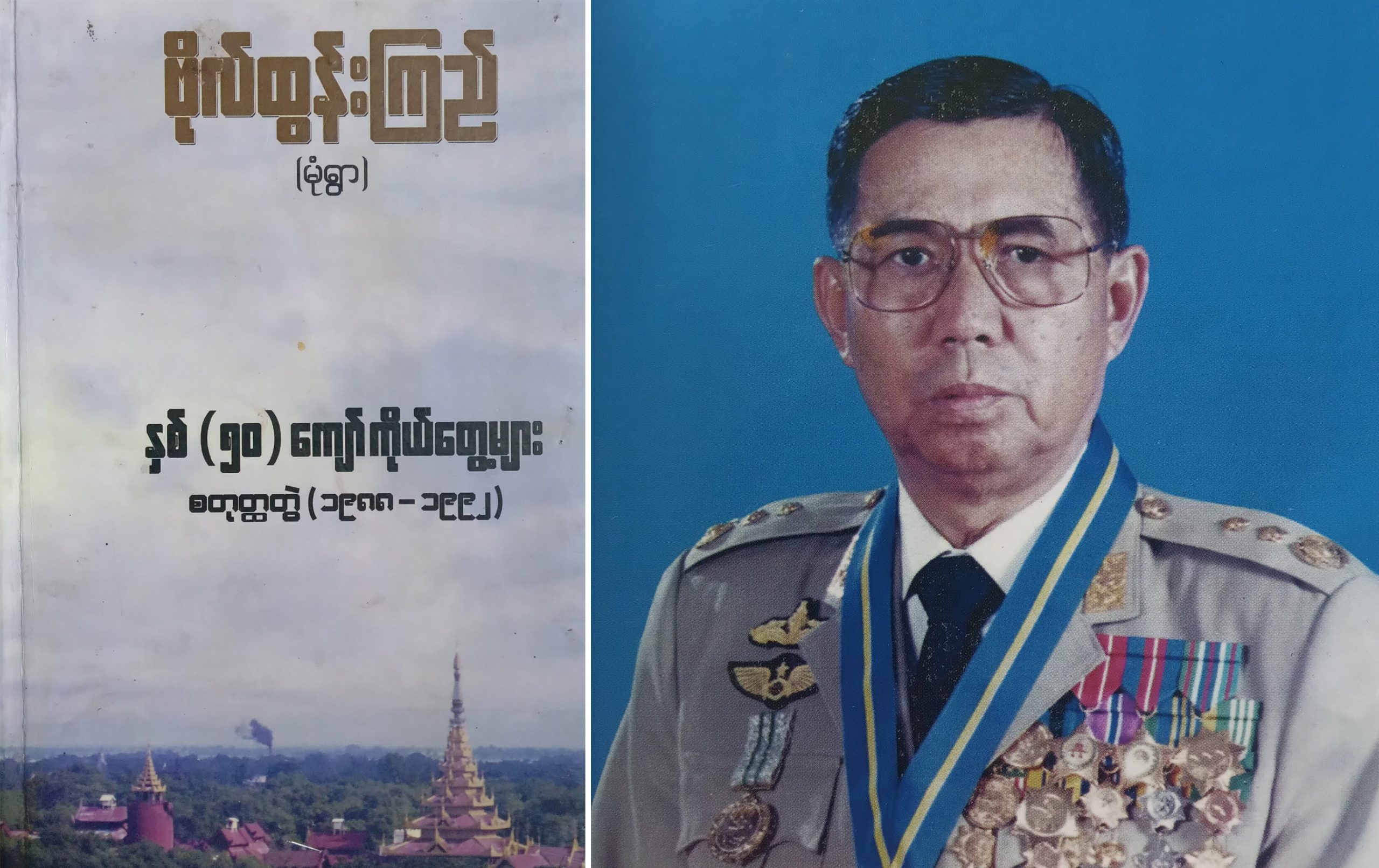
This is the five-volume autobiography by Lt-Gen Tun Kyi, who served as the chief of Mandalay Command and commerce minister under the State Law and Order Restoration Council (SLORC) and its successor the SPDC.
The lieutenant general, who was notorious for corruption, graduated from the Defense Services Academy as part of its first intake. He was a classmate of Than Shwe’s deputy Maung Aye. He was also present when Min Aung Hlaing paid respects to retired military generals at an event to mark Armed Forces Day in March, showing solidarity with the junta chief.
The first volume of his book was published before the Thein Sein administration came to power, and the fifth volume came out before the NLD government took office in 2016.
“I could lead a proper life thanks to the Tatmadaw [Myanmar military],” writes Tun Kyi. His books are nothing more than a medium he uses to blow his own trumpet and praise the Myanmar military.
About the 1990 general elections in which the NLD won a landslide victory, Tun Kyi justified the military’s refusal to hand over power to the party, citing its ties with Western countries.
In his fourth book, Tun Kyi admitted that he raised funds by any means. He was sacked in 1997 together with his contemporaries Maj-Gen Kyaw Ba and Maj-Gen Myint Aung amid a corruption scandal. Anawmar Art Group, which won the rights to restore the Secretariat Building—the historic site where General Aung San and his colleagues were assassinated in 1947—and preserve it as a long-term venue to host the arts, with a cultural center and a museum, is owned by Daw Thi Thi Tun, a daughter of Tun Kyi.
In the preface to the first volume of his book, Tun Kyi urges younger generations to take lessons from his folly, but Min Aung Hlaing took a cue from Tun Kyi on how to make money, and the junta chief’s family had amassed enormous wealth within one year of the coup.
Unexpected Journey of Prime Minister General Soe Win
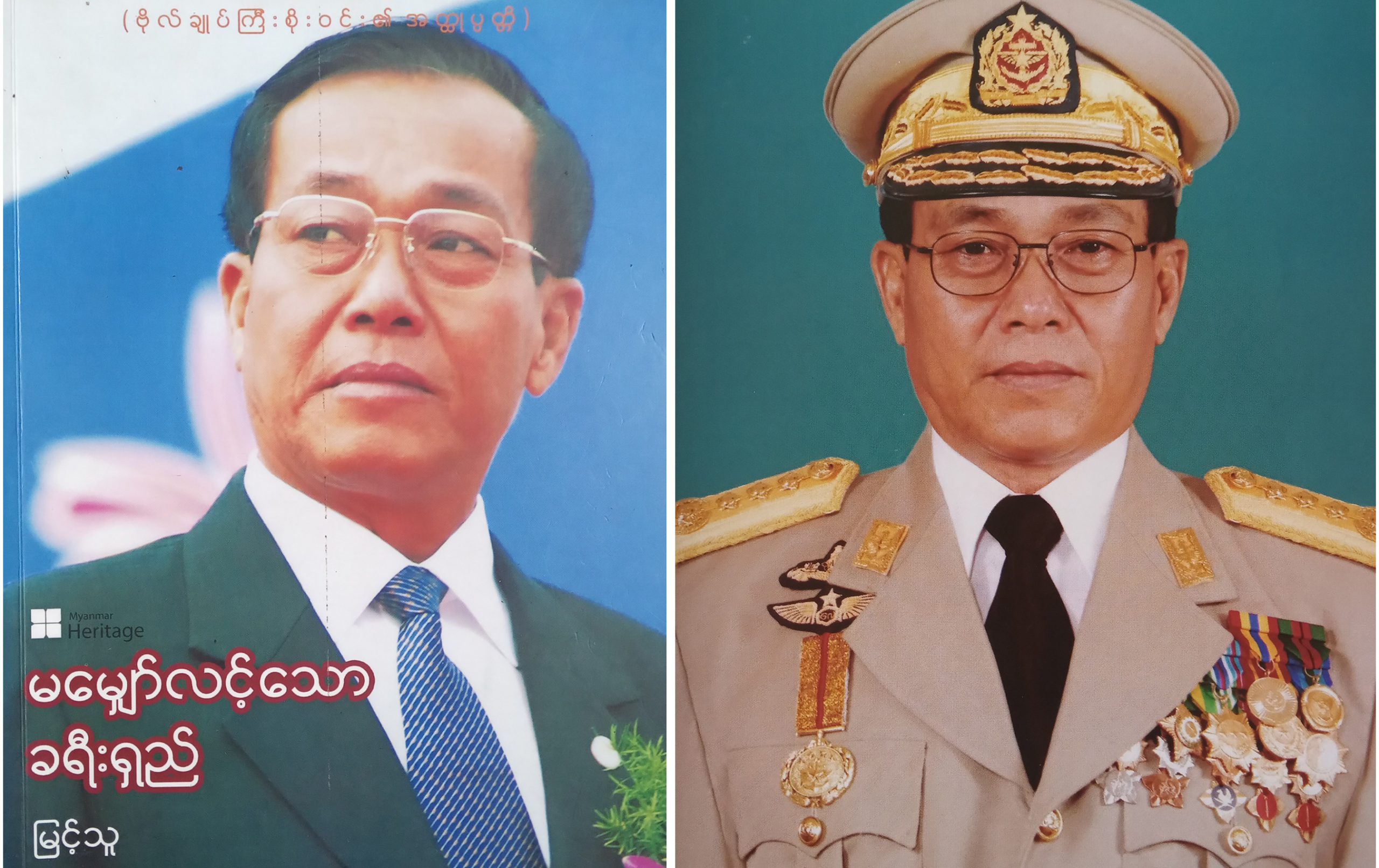
This book is a biography of General Soe Win, who served as the prime minister of the SPDC regime. The book authored by Myint Thu draws on extensive interviews with more than 100 individuals close to Soe Win. It was published by Myanmar Heritage Publishing House in 2014 under the Thein Sein administration.
Soe Win succeeded Khin Nyunt after his purge. He was earmarked by Than Shwe and Maung Aye as the president after the democratic transition. As he died prematurely of cancer, Thein Sein, who succeeded him, became the president.
Soe Win, who said Myanmar would have collapsed without the Tatmadaw, oversaw the brutal crackdown on pro-democracy protesters in front of Yangon City Hall on Aug. 8, 1988 known as Four Eights in Myanmar. Though many people were slaughtered in the crackdown, Soe Win said no one died, and claimed that some people might have injured themselves while fleeing. The author describes him as a hero regarding the way he handled the Buddhist monks involved in the pro-democracy protests in 1988.
The SPDC Secretary-2 and USDP patron was widely regarded as the mastermind behind the Depayin Massacre when junta-backed thugs and USDP members attacked a convoy transporting NLD chairwoman Daw Aung San Suu Kyi in Depayin Township, Sagaing Region. At the instruction of SPDC chairman Than Shwe, he flew to Monywa and made real-time reports to Than Shwe and regime leaders about the attack.
In the book, the Depayin Massacre is simply referred to as a riot. Soe Win defended himself by saying he acted to avoid conflicts for the safety of Daw Aung San Suu Kyi. The then regime said four people died and 70 others were injured in the attack, which was far from the truth. Overall, the book conceals the truth about the 1988 pro-democracy uprising and the Depayin Massacre while praising the military.
Myanmar’s Current Political Landscape and My View 1988-2014
by former Colonel Hla Min
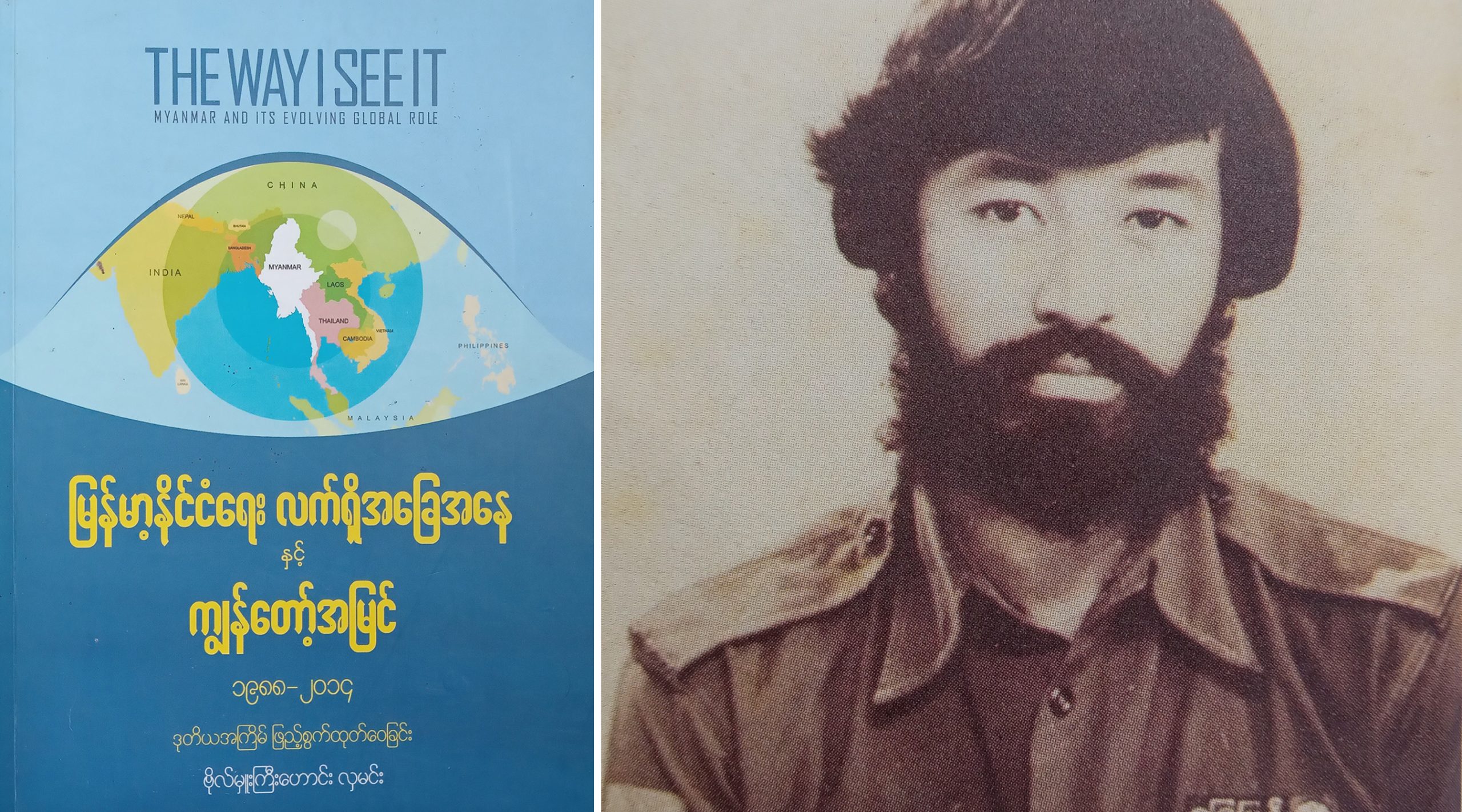
This book is authored by military intelligence officer former Colonel Hla Min. He was from the Strategic Studies Department of the Defense Ministry and was the previous junta spokesman. He was jailed when the Military Intelligence was dissolved, and many MI chiefs were locked up following the purge of MI chief Khin Nyunt in 2004.
He spent seven years behind bars and was released in 2011. The book was published in 2014 and is the amended and supplemented version of the book he wrote as an MI official. Throughout the book he defends the SLORC and SPDC, and criticizes Western countries, especially the US.
He offers the defense that the military took power in 1988 to save the country from collapse, and supports the military’s refusal to hand over power to the NLD after the 1990 general elections. He opposes the proposed amendment to Article 59(f) in the army-drafted constitution, which bars Daw Aung San Suu Kyi from the presidency. About the 25 percent of seats held by the military in national and sub-national legislatures, he calls it a pre-emptive action to prevent politicians from harming the national interest.
The book is no better than other propaganda books written by the current regime’s International Cooperation Minister U Ko Ko Hlaing under the SLORC and the SPDC. The book does not mention a single word about how the MI persecuted political dissidents in the aftermath of pro-democracy protests in 1988. The book was also published in English.
You may also like these stories:
Regime Airstrike Destroys Hospital in Lower Myanmar
Junta Chief to Preside Over Myanmar’s First Grand Military Review in Seven Years
Resistance Fighters and KIA Clash With Junta Forces in Northern Myanmar

















